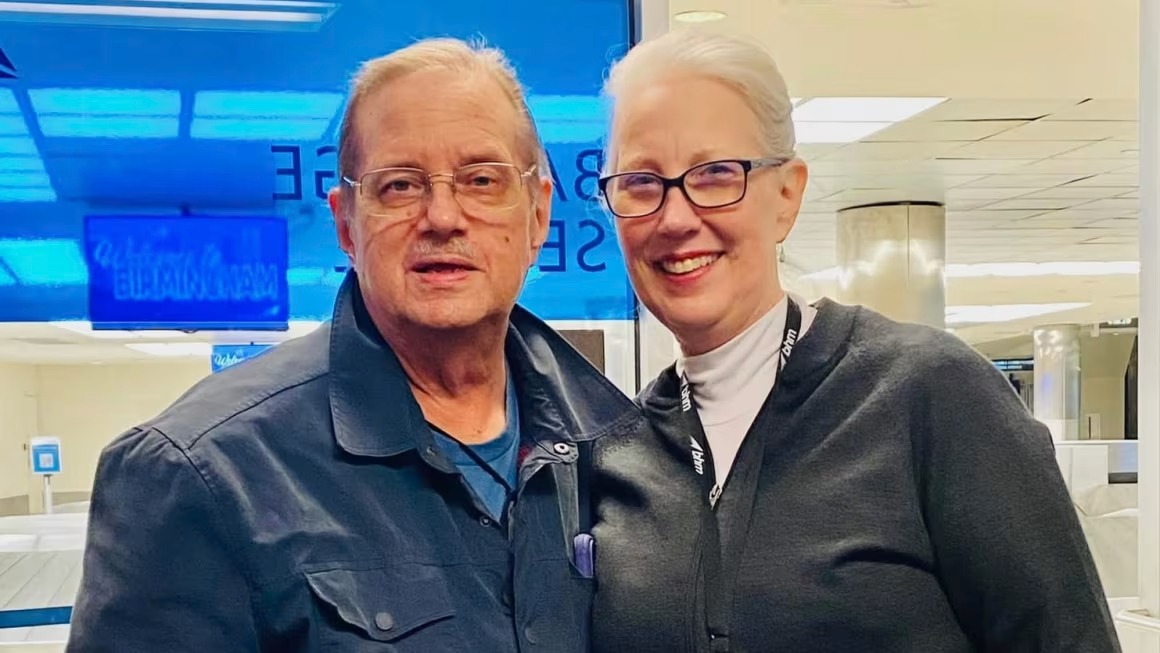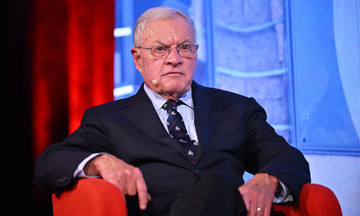Since the late 1980s, Bruce Gamble frequently flew weekly from Birmingham, Alabama, for his work consulting with car dealerships. Over the years, he became acquainted with Delta Air Lines employees at Birmingham-Shuttlesworth International Airport.
Jill Hickey, a part-time Delta employee of 4 years, was used to Gamble stopping by the customer service desk for water after his flights. Neither of them could have predicted that these encounters would one day save his life.
Hickey, 57, believes their meeting was fate. "I knew Bruce had some health issues, but I didn't know the extent of them or what he really needed," Hickey said.
 |
Bruce Gamble and Jill Hickey at Birmingham-Shuttlesworth International Airport. Photo: CNN |
Bruce Gamble and Jill Hickey at Birmingham-Shuttlesworth International Airport. Photo: CNN
In 11/2022, Gamble, now 74, discovered he needed a kidney transplant. Diagnosed with type II diabetes in 2002, his doctor informed him his kidney function was declining. He faced a 3-5 year wait for a kidney from a deceased donor, but by then, he would be 75-78 years old, potentially too old for the surgery. He felt he had no choice but to actively seek a living donor.
"When somebody would ask, 'How are you doing, Bruce?', I would reply, 'I'm doing okay, just looking for a kidney,'", he shared.
This simple statement often led to "deeper conversations" about organ donation, including compatibility testing and ensuring the donor's health. He made his need for a kidney known wherever he went.
According to the National Kidney Foundation, the wait time for a kidney transplant depends on several factors, including time on dialysis or the transplant waiting list, blood type, location, and antibody levels. However, transplants from living donors can happen much faster.
One evening, several Delta employees were discussing how to help Gamble when Hickey overheard. She and a colleague decided to get tested.
When Hickey shared her decision with her family, her husband and daughters, both in their 20s, were apprehensive. One daughter even cried, fearing the surgery's risks. However, they ultimately supported her desire to help.
Hickey's primary job is as a gifted education teacher at an elementary school. She had encountered students in need of organ transplants, an experience that fueled her desire to help someone in a similar situation if she was ever able.
"I was stunned, speechless," Gamble recalled upon learning of Hickey's intention. He told his wife a donor had emerged after his persistent sharing of his story.
Kidneys transplanted from living donors typically function immediately and can last longer than those from deceased donors. According to the National Kidney Foundation, a kidney from a living donor can function for 15-20 years, while a kidney from a deceased donor lasts 7-10 years.
Individuals with only one kidney can live full lives but must maintain good health.
Over two years, 10 people volunteered to be tested as potential kidney donors for Gamble, but none were suitable. Then Hickey came along. She was the 11th person tested, and she was a perfect match.
"When Jill called with the news, I was speechless. I was just numb," Gamble said. "God blessed me by bringing Jill into the picture at this point in time. She's extending my life, and I've told her that numerous times."
A friend of Gamble's gave Hickey a prayer book. On the day of the surgery, she opened it to a page that read: "Let me guide you step by step through this day. If you put your trust completely in me, you can walk through the shadows without fear."
"Those words reinforced my faith that everything was going to be okay, that I was here for a purpose," Hickey said. "Our paths crossed at just the right time, for a reason."
According to data from the U.S. Health Resources and Services Administration provided by the National Kidney Foundation, approximately 90,000 people are on the waiting list for a kidney transplant in the U.S. In 2023, around 27,000 people received kidney transplants, and approximately 6,300 of those were from living donors.
Gamble and Hickey underwent surgery in 12/2024 in Birmingham. During the procedure, doctors discovered an issue with the blood vessels around Hickey's kidney that could have impacted her future health. As a result, the surgery took longer than expected but was ultimately successful.
Several months later, Hickey and her husband joined Gamble and his wife on a trip to California. Gamble has collected cartoons for over 35 years. Hickey believes his passion for animation has sparked creative ideas she can apply to her teaching. The two couples plan to continue traveling together.
Donating a kidney does not shorten the donor's lifespan. According to the National Kidney Foundation, some studies suggest donors may even live longer than average because only the healthiest individuals are allowed to donate.
Life has returned to normal for Hickey and Gamble. Hickey teaches full-time during the day and works for Delta in the evenings. Gamble still travels occasionally for work. He has reduced his workload but continues to train car dealers. However, one important thing has changed forever.
"We started out as strangers, but now we're more than family," Hickey shared.
Hong Hanh (CNN)












